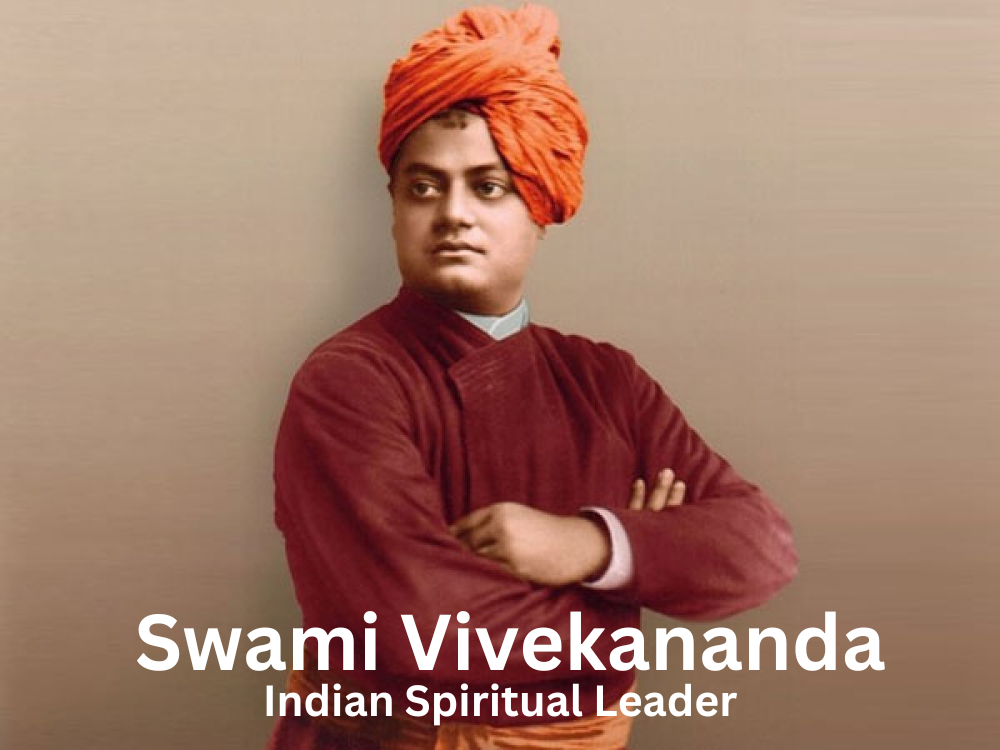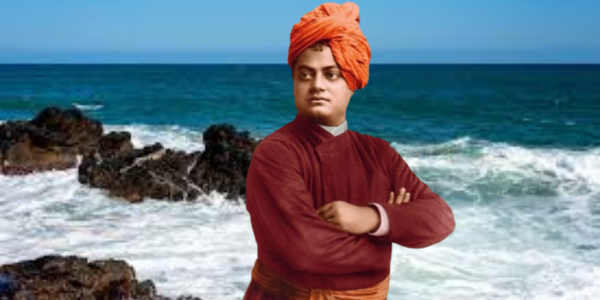Swami Vivekananda was a great Indian spiritual leader who received the highest esteem regarding propelling Indian philosophy and Vedanta into the Western world. He delivered his speech in the Parliament of the World’s Religions in the year 1893, one of the most well-recognized acts that also greatly emphasized the cause of religions involving interfaith tolerance and harmony. In fact, Swami Vivekananda’s teachings inspire millions around the globe today.
Personal information
| Full name | Narendranath Datta |
| Born | 12 January 1863, Kolkata |
| Religion | Hinduism |
| Parents | Vishwanath Datta, Bhubaneswari Devi |
| Education | Scottish Church College (SCC), Vidyasagar College (1871–1877), Presidency University, University of Calcutta |
| Influenced by | Ramakrishna, Debendranath Tagore |
| Literary works | Raja Yoga Karma Yoga Bhakti Yoga Jnana Yoga My Master Lectures from Colombo to Almora |
| Died | 4 July 1902 (age 39 years), Belur Math, Howrah |
Swami Vivekananda birthday and Family Background
Narendranath Datta was born on 12 January 1863 in Calcutta, India. His father is described as a successful lawyer, and his mother, Bhuvaneshwari Devi, as devout. Young Narendranath had a keen interest in spirituality and generally asked questions regarding the meaning of life.
Education and Spiritual Awakening
Primary Education and Interests
Narendranath was a brilliant student with a lively intellect. He had achieved mastery in all fields—study, music, and sports. He attended Presidency College and Scottish Church College and pursued degree courses in philosophy and Western logic. But it was not to be; his spiritual search threw him for answers beyond formal education.
To Seek Ramakrishna Paramahansa
It was this new meeting between Narendranath, commonly known today by the name Vivekananda, and Ramakrishna Paramahamsa, a mystic and saint. He was to become the spiritual guide and tutor him to self-realization and knowledge. This was the beginning of change that would make him Swami Vivekananda.
Path to Spiritual Leadership
Influence of Ramakrishna’s
Then the great guru, Ramakrishna, moulded Narendranath into a renouncer of material attachment and dedicated him to a life of spiritual pursuit. Even after Ramakrishna was gone, Vivekananda accepted the challenge of sending out his guru’s message of unity, love, and tolerance.
Foundation of the Ramakrishna Mission
Swami Vivekananda set up the organization “Ramakrishna Mission” that, in 1897, he aimed at spiritual development and social welfare projects, including education, health, and other forms of relief work for the distribution of the message of Vedanta and selfless service to humanity.
Teachings and Philosophy
Vedanta and Yoga
Swamiji was a vociferous exponent of Vedanta, the ancient Indian philosophy of all being one in essence. He preached yoga as a tool for attaining self-realization through physical as well as mental control.
Universal Brotherhood and Tolerance
Universal brotherhood was the central message of Swami Vivekananda. For him, all religions lead to the same ultimate truth; hence, differences between faiths should be welcomed and not dreaded. Toleration and unification became the need of the hour in a society that was sharply divided on the basis of religion.
Swami Vivekananda at the Parliament of the World’s Religions (1893)
Historic Speech in Chicago
One of the most historic and most said events of interfaith dialogue has been the speech by Swami Vivekananda in the Parliament of the World’s Religions on September 11, 1893, in Chicago. It was for the first time in the world scene that Indian spirituality and Hinduism were ever mentioned.
Key Highlights of the Speech:
1. Opening Words: Swami Vivekananda started his speech with the very powerful greeting “Sisters and Brothers of America, a greeting that easily won the hearts of the audience and resulted in a long-standing ovation. This was a greeting that epitomized the message of universal brotherhood and unity.

2. Universal Tolerance and Religious Harmony: He emphasized the need for harmony and acceptance among all religions, stating:
“I am proud to belong to a religion which has taught the world both tolerance and universal acceptance. We believe not only in universal toleration but we accept all religions as true.”
3. India’s Spiritual Heritage: Vivekananda spoke about India’s rich tradition of spirituality, highlighting how India had always been a safe haven for different religious groups, such as Zoroastrians, who found refuge in India centuries ago.
4. Unity of Religions: One of the central themes of his speech was the idea that all religions lead to the same truth. He stressed the importance of respecting all religious paths, saying:
“As different streams having their sources in different places all mingle their water in the sea, so, O Lord, the different paths which men take… all lead to Thee.”
5. Condemnation of Religious Bigotry: Swami Vivekananda denounced extremism, prejudice, and sectarianism, claiming that these are the main causes of misery and violence in the world. He exhorted people to put aside differences in religion and embrace unity:
“Sectarianism, bigotry, and its horrible descendant, fanaticism, have long possessed this beautiful earth… But their time has come, and I fervently hope that the bell that tolled this morning in honor of this convention may be the death-knell of all fanaticism.”
Impact on the West
After the speech, Vivekananda spent several years in the United States and Europe lecturing on Indian spirituality, Vedanta, and yoga. He introduced Western audiences to a much richer cultural and spiritual heritage, leaving deep influence on thinkers, philosophers, and intellectuals.
Also read Ramkrishna Paramhansa Biography
Vivekananda’s Work for India
Empowering Youth and Education
On his way back to India, Swami Vivekananda worked for the development of youth power. So much confidence was instilled into the approach that he actually believed that the future success of the nation rested in the hands of the youths who embraced knowledge, self-confidence, and spiritual values. In addition, he fought for the establishment of a comprehensive education system that integrated modern science with spiritual wisdom.
Revival of Indian Culture
Swami Vivekananda played a great role in reviving Indian culture and giving a sense of pride during British rule. He inspired Indians to respect their sacred traditions and give something to society’s progress.
Vivekananda’s Contributions to the Indian Society
Establishing Educational Institutions
Vivekananda set up schools and colleges through the Ramakrishna Mission so that students would be enlightened with both spiritual and practical knowledge. These schools are still engaged with people in India today.
Promoting Social Reforms
The man was highly dynamic in social reform, more specifically about the upliftment of the poor and the downtrodden. He also underlined the service to human beings as the greatest form of worship because, according to his view, serving other people is the biggest form of worship.
Swami Vivekananda’s speech to the Youth
Self-Confidence and Self-Reliance
Swami Vivekananda requested the young minds to believe in themselves and build self-reliance. According to him, society was full of transformational energies if it was possible through making the youth good character and a sense of duty.
Universal Brotherhood
Always, Swami Vivekananda had emphasized the requirement of religious tolerance and unity among all faiths. He believed that all religions were paths to the same ultimate truth, and he preached the message of universal brotherhood.
“We believe not only in universal toleration but we accept all religions as true.”
Importance of Service to Humanity
One of the greatest teachings of Swami Vivekananda was that of service to humanity. He mostly believed that through service, mankind can achieve spiritual growth and fulfillment.
“They alone live who live for others, the rest are more dead than alive.”
Spirituality and Practical Action
Swami Vivekananda’s philosophy was an integration of the spirit world with practical activity. He advocated spiritual growth as well as active service for the good of humankind. Swami believed in the path of selfless action, that is, Karma Yoga.
Later Life and Travels
Swami Vivekananda spent the latter years of his life traveling throughout India as well as the world, spreading Vedanta and spiritual growth. Through lectures and writings in many languages, he spanned the earth, touching cultures and civilizations of all walks of life.
Passing Away at a Young Age
Swami Vivekananda died on July 4, 1902. The extraordinary person lived only for 39 years. This is not much as a human life span goes, but the impact of his contribution to the spiritual world and social reform is huge.
Legacy of Swami Vivekananda
Influence on Indian Freedom Fighters
Swami Vivekananda’s teachings, therefore, have been the mentor for most of India’s freedom fighters, taking independence to its final rank of nationalistic quarters in terms of great freedom fighters like Mahatma Gandhi and Subhas Chandra Bose and many such freedom fighters. End.
Global Impact on Spirituality
He did not only bring the power of India to the world. He inspired the world to find Indian spiritual movements, which has changed the way the world thinks about spirituality in the modern era.
Swami Vivekananda Books
Swami Vivekananda is one of the grand Indian gurus, writers, and thinkers. His books are very famous in all literary genres and have gained excellent repute, particularly in the genres of philosophy, spiritualism, and self-development. Some of his most famous works are as follows:
“Raja Yoga” – This is a book that explains the practice of Raja Yoga, the way to meditation, and how this mediation enables human beings to realize their potential in thought.
“Karma Yoga” – Is a book in which Swami Vivekananda describes the philosophy of Karma Yoga as the path of work with a selfless intent and how that work can be an auspicious route towards spiritual advancement.
“Jnana Yoga“-Philosophy of knowledge based on this book refers to Vedanta and spiritual enlightenment through wisdom and discernment.
“Bhakti Yoga“-This book deals with the path of devotion and love for God as a means to attain spiritual realization.
“My Master” – A befitting tributes to his guru, Swami Vivekananda, has published stories and gleaning insights into the life of his spiritual teacher, Sri Ramakrishna.
There is “The Complete Works of Swami Vivekananda” – This i is a collection of his teachings, lectures, letters, and writings. This is one of the very good resources to study his philosophy in a great way.
Then comes “Lectures from Colombo to Almora.”- This collection of lectures that Swami Vivekananda had delivered on his journey back to India after the West reflects his thoughts regarding religion, spirituality, and nationalism.
“Inspired Talks“– A collection of informal talks delivered to his closest American disciples on such spiritual themes, explained in simple terms.
These works are great source material for those seeking to know about spirituality, self-discipline, and inner change.
Swami Vivekananda Quotes
Here are some powerful and inspiring quotes by Swami Vivekananda:
“Arise, awake, and stop not until the goal is reached.“
“Strength is life, weakness is death.“
“Take risks in your life. If you win, you can lead; if you lose, you can guide.“
“The greatest sin is to think yourself weak.“
“Be a hero. Always say, ‘I have no fear.’ Tell this to everyone – ‘Have no fear.‘”
“You cannot believe in God until you believe in yourself.”
National Youth Day in India
Swami Vivekananda Jayanti is celebrated as a form of effort to celebrate the birth anniversary of one of the greatest religious heads, philosophers, and social reformers India has ever produced, Swami Vivekananda. It falls on January 12th each year. Otherwise, it is also called National Youth Day in India.
Conclusion: The Lasting Influence of Swami Vivekananda
A spiritual leader was much more than a manifestation. It may even be said that he was a visionary who spent his lifetime for the service of humanity. And the message of universal brotherhood, tolerance, and pursuit of spiritual knowledge inspires every person in this world. In his work, he laid down the foundation of a spiritually strong, self-reliant India. His teachings inspire all who seek meaning and purpose in life.
FAQs
What is Swami Vivekananda known for?
Among the known figures till now regarding the introduction of Indian Vedanta and yoga in the West, one cannot negate the name Swami Vivekananda and his contribution to promoting spiritual growth and social reform in India.
Why is Swami Vivekananda a great leader?
Swami Vivekananda is regarded as a great leader and inspires through the vision of upliftment of the spiritual, social reform, and national pride. Self-reliance, unity, and service towards humanity represent the core ideas that have inspired millions of hearts. He taught the principles of inner strength, personal development, and cultural revival in India. He said, “Atmano Mokshartham, Jagat Hitaya Cha.”. Meaning all work is an opportunity to do good to the world.
Who was the guru of Swami Vivekananda?
The guru of Swami Vivekananda was the greatest Indian mystic and teacher: Sri Ramakrishna Paramahamsa. Ramakrishna is said to have lived between 1836 and 1886. He was highly known for the vivid experiences regarding the divine and the deep sense of devotion that he carried towards the divine. He strongly emphasized oneness of all religions and claimed that God could be approached in a number of ways—ranging from devotion, knowledge, and selfless action—and thus assembled an extremely diverse group of devotees who cut across the old boundaries of class, caste, and region.
How did Swami Vivekananda die?
Swami Vivekananda died on July 4, 1902. He was only 39 years of age. As reportedly predicted by himself, he would not be allowed to stay alive beyond his fortieth year of life. On the day of his death, he sat for several hours in meditation and then died in his meditation room at Belur Math, which he had founded.
Cause of death not established; people think it was a natural death, possibly due to exhaustion from his intense spiritual and social work and due to some ailments such as asthma and diabetes. Those who follow him have considered it a mahasamadhi, a yogi’s conscious transit out of the body, according to his belief in controlling life and death through spiritual mastery.
Is Swami Vivekananda a freedom fighter?
Though he was not a direct exponent of India’s freedom fight, Swami Vivekananda’s teachings on spiritual awakening and nationalism were inspiring freedom fighters. His ideas could shape the independence movement in India in a significant way.
What is the Swami Vivekananda Scholarship (SVMCM)?
One of the schemes offered by the West Bengal government in India to study higher education for meritorious and economically backward students is the SVMCM scholarship.




I have recently started a site, the info you offer on this web site has helped me greatly. Thanks for all of your time & work.
I?¦m not certain the place you’re getting your information, but great topic. I needs to spend a while studying much more or understanding more. Thanks for excellent information I was in search of this information for my mission.
Perfect piece of work you have done, this internet site is really cool with superb info .
Would you be desirous about exchanging hyperlinks?
Great write-up, I?¦m normal visitor of one?¦s website, maintain up the excellent operate, and It’s going to be a regular visitor for a lengthy time.
I would like to thnkx for the efforts you have put in writing this blog. I am hoping the same high-grade blog post from you in the upcoming as well. In fact your creative writing abilities has inspired me to get my own blog now. Really the blogging is spreading its wings quickly. Your write up is a good example of it.
I’ve been absent for a while, but now I remember why I used to love this site. Thank you, I will try and check back more often. How frequently you update your site?
Merely wanna comment on few general things, The website design and style is perfect, the written content is real great. “To establish oneself in the world, one has to do all one can to appear established.” by Francois de La Rochefoucauld.
Hey very nice blog!! Man .. Excelllent .. Amazing ..
I will bookmark your website and take the feeds additionally?
I aam happy to sewk out numerous useful information here
in the post, we need develop extra techniques on this regard, thank
you for sharing. . . . . . https://Fortune-Glassi.Mystrikingly.com/